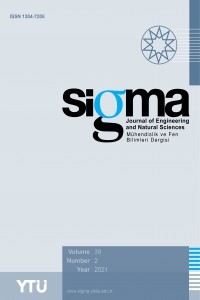WASTE GLASS MANAGEMENT FOR BAKIRKOY MUNICIPALITY: A CASE STUDY
Municipal solid waste, recycling, waste collecting systems waste glass, waste management.,
___
- [1] T.C. İstanbul Valiliği Çevre ve Şehircilik İl Müdürlüğü. İstanbul Çevre Durum Raporu 2010 - 2011. 269-301, İstanbul, 2012.
- [2] T.C. Resmi Gazete, Ambalaj Atıklarının Kontrolü Yönetmeliği. (28035), 24/8/2011.
- [3] S.P. Gautam et al. Use of Glass Wastes as Fine Aggregate in Concrete, J. Acad. Indus. Res., 1(6): 320-322, 2012.
- [4] I.B. Topçu, and M. Canbaz. Properties of Concrete Containing Waste Glass. Cement Concrete Res. 34: 267-274, 2004.
- [5] A. Pır. Bakırköy İlçesinde Entegre Katı Atık Yönetimi. Yüksek Lisans Tezi, Yıldız Teknik Üniversitesi, Fen Bilimleri Enstitüsü, Çevre Mühendisliği Bölümü, 2013.
- [6] T.C. Resmi Gazete, 2872 sayılı Çevre Kanunu. (18132), 11/8/1983, (Değişik: R.G.: 13/5/2006-5491 sayılı Kanun).
- [7] Ministry of Local Government and Provincial Councils of Sri Lanka. Solid Waste Collection and Transport, Service Delivery Training Module 1 of 4. Sri Lanka, 2008.
- [8] MEGEP. Çevre Koruma ve Katı Atık Toplama, Ankara, 2009.
- [9] A. Şahin. Peyzaj Mimarlığı Tasarım Sürecinde Bilgisayar Kullanım Olanaklarının Alanya Atatürk Parkı Örneğinde İrdelenmesi. T.C. Selçuk Üniversitesi, Peyzaj Mimarlığı A.B.D., Yüksek Lisans Tezi, Konya, 2007.
- [10] A. Benliay, Bilgisayar Destekli Tasarım Sürecinde Peyzaj Tasarım Projelerinin Sunum Tekniklerinin A.Ü.Z.F. Dekanlık Kampusu Projesi Örneğinde İrdelenmesi. Yüksek Lisans Tezi. Ankara Üniversitesi Fen Bilimleri Enstitüsü, Ankara, 2001.
- ISSN: 1304-7191
- Yayın Aralığı: Yılda 4 Sayı
- Yayıncı: Yıldız Teknik Üniversitesi
Rafet ŞİŞMAN, Abdurrahman ŞAHİN
Umut ÇETİN, Betül GÖNCÜ, Deniz UÇAR
Orkun YILMAZ, Abdurrahman ŞAHİN
Mehmet YILMAZ, Baha Vural KÖK, Özge ERDOĞAN YAMAÇ
Volkan KAHYA, Onur ARAZ, Muhittin TURAN
Ahmet Sancak ŞANLI, Ahmet DOĞAN
Nihal ERATLI, Merve ERMİŞ, Mehmet H. OMURTAG
Ali Erdem ÖZÇELİK, Recep NİŞANCI, Osman DEMİR, Halil İbrahim İNAN
